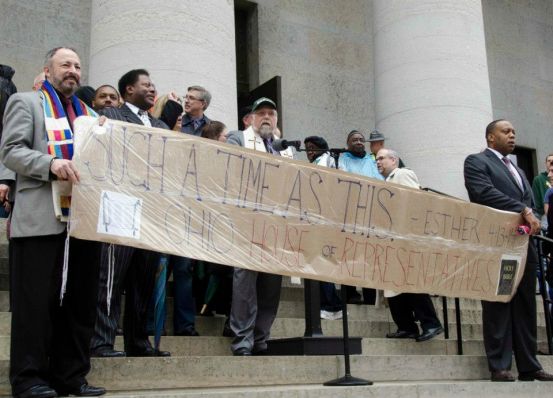Submitted by clevine on Wed, 02/05/2014 – 11:55am
By: Cathy Levine, Executive Director, UHCAN Ohio
When I invited Rev. Timothy Ahrens, Senior Pastor at First Congregational Church in Columbus (UCC) to introduce me at a national health care conference recently, I wanted health care advocacy leaders to hear about our movement from the perspective of a faith leader. (Those of you who attended the large rally for Medicaid expansion at the Ohio Statehouse last April, may remember Rev. Ahrens as the pastor who shook the Statehouse with his passionate appeal.)

Rev. Ahrens probed me on what he should say to the national advocates. Although many health care advocates came to health reform through faith communities, I wanted Rev. Ahrens to deliver a message to a group of people whose commitment to health care justice is not necessarily tied to a religious faith or tradition about the role of religious communities in our work. I believe passionately in the role of religious communities in campaigns for social and economic justice for all people, while, at the same time, believing strongly that government should not impose religious expression on its people. I needed to sort this out for myself. Here goes.
In full disclosure, almost two decades ago, I became active in my synagogue, including its religious observance and study. For me, it happened as I explored why so many Jews were involved in civil rights and social justice activism. However, building relationships with faith communities should be a priority for all health care advocates, whether they are religious or secular.
Advocates for health care reform labor to promote sound analysis of why health care for all is good for our economy. But most of us involved in consumer health advocacy see the issue as a matter of plain fairness and decency – that no one should face financial ruin, live sicker and die younger for lack of access to affordable health care. The values underlying the world’s major religions – taking care of one another, “there for the grace of God go I,” – reflect what health care advocates feel in our guts, whether we identify ourselves as religious or not. That commitment to look out for one another informs our view of the role of government – as ensuring that all of its people have access to basic human needs and a fair opportunity for health, happiness and prosperity.
Because – at least in Ohio – it’s fair to assume that a majority of elected officials identify themselves as people of faith, it makes sense for us to promote messengers who are able to communicate a message about the role of government in caring for all of its people, in terms they can receive. That’s why faith leaders are such great communicators. Faith leaders provide a unique voice communicating the moral imperative to provide health care for all Ohioans and be heard by elected officials.
Faith communities are also critical to our coalitions’ need to mobilize grassroots Ohioans in communicating their support for our causes to elected officials. UHCAN Ohio and its coalition partners constantly seek more effective ways to build the grassroots voice. The most effective mobilization efforts come from organizations with large memberships – labor unions, AARP, American Cancer Society, etc.- that share our concern for health care. Faith communities, like unions and civic organizations, are organizations comprised of large numbers of people united around common values that may lead them to align with the policy priorities of health care advocates. In plain terms, all of the major religions in the US have long supported policies to ensure access to affordable health care for all Americans and are, thus, natural allies to health care advocates – with messages and messengers many decision-makers can relate to.
As with all relationships, health care coalitions need to approach faith communities with respect for those communities’ cultures. Once aligned on the policy issues, faith communities need space to figure out how they will bring the issues and calls to action to their members, as opposed to just using our messaging materials. Their messages and methods may differ from those of other coalition members. And, that’s okay.
Mobilizing Faith Communities of Color
Faith communities are anchors of African American, Latino and other racial and ethnically diverse communities, for some obvious reasons. The church is a haven against the institutional, cultural and inter-personal discrimination that people of color face daily in the larger world. The church provides spiritual support and renewal and provides intellectual stimulation (bible study is not for pikers). People of color often passed over for leadership in the larger society often develop skills and assume leadership roles in their faith communities.
As health care advocates pursue outreach and enrollment in the new Marketplace and other aspects of health care reform implementation, building lasting relationships of mutual respect with faith communities will yield rich rewards – sooner rather than later.